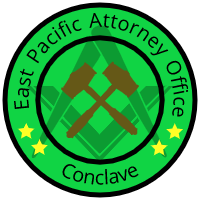The East Pacific Attorney Office
Welcome to the East Pacific Attorney Office (also known as the EPAO)! The EPAO is an office meant to provide defending parties in trial a certified representative: one who knows the ins and outs of East Pacifican law. It was instated as an Administrative Rule via majority Conclave vote on April 28, 2020.
It is suggested to read the rule regarding the EPAO in order to learn more about the information listed below.
Certified Attorneys
| Name | Discord | Forum Profile | Nation |
|---|---|---|---|
| Atlae | Atlae#0779 | Profile | The Atlae Isles |
| Zukchiva | derp#9479 | Profile | Zukchiva |
| Bachtendekuppen | Bachtendekuppen#8436 | Profile | Bachtendekuppen |
Badge of an Attorney
![]()
(All Certified Attorneys are required to put this into their forum signature.)
How Do You Become an Attorney?
Glad you asked! To be an attorney, you MUST be a Citizen of the East Pacific. Also, you cannot be an Arbiter nor the Delegate (and if you do become one of those positions, you will have to resign and retake the test after you resign from those specific positions).
Secondly, you need to take the Standardized Test of Attorney Acceptability and Responsibility (STAAR). To find out more about getting certified, please CLICK THIS LINK TO ACCESS THE TEST AND OTHER INFORMATION.
What happens if I do not want an attorney from the EPAO?
Then talk with the Presiding Arbiter of your case. While it is recommended to ask for an EPAO attorney, you have the right as a citizen to be represented by any other citizen in trial. However, it should be noted that the EPAO is the only source of government-sanctioned attorneys.
What are an Attorney’s Duties?
The duties of an attorney are the following:
- To clarify to their client the charges being leveled against them, and any trial developments.
- To remain truthful in all matters with the client.
- To be prompt in communications with the client.
- To appear promptly before the court if called.
- To adhere to the ethics of their office.
- To follow the client’s wishes when possible.
What happens if the Attorney fails their duties?
Well, the client can request the Presiding Arbiter to remove the Attorney from representing them. The client may also ask for another attorney to represent themselves, or they may refuse any further attorneys. However, if the PA does not accept the Client’s request, the Attorney will continue to represent the Client.
Do Clients have duties?
Why yes! They are as the following:
- To tell the truth of the case to their attorney.
- To remain honest in all matters with the attorney.
- To inform the Attorney of their intention to submit pleas, evidence, etc.
- To refrain from asking the Attorney to act illegally or to violate the ethics of their office.
- To be prompt in communications with their Attorney.
- To be prompt in appearing when the Client’s prescience is requested by the court.
What happens if the Client fails their duties?
Well, the Attorney can request the Presiding Arbiter to disallow the Attorney from continuing to serve the Client. If this request is granted, the Client shall be granted another Attorney, although the previous Attorney is still bound by professional ethics. Should the PA deny the request, the Attorney will continue to represent the Client.
What are these ethics you keep mentioning?
An Attorney is required to abide by certain behaviors and moral guidelines when they are serving, with these guidelines being “professional ethics” tied with the office. These are the ethics an Attorney must follow:
- To maintain Client-Attorney Confidentiality, that is, that no information given in confidence by the Client to the Attorney may be revealed without the former’s explicit consent;
- Avoid conflicts of interest.
- To commit no crime.
- To inform the Client of any and all legal consequences of making any information public.
- To not neglect a case assigned to them.
- To not knowingly use perjured testimony or false evidence.
- To not act illegally, even upon a Client’s request.
- Not to knowingly assert false statements of law or fact (a.k.a. as lying)
- To inform the Presiding Arbiter of any illegal actions by the Client, except when such revelation breaks Client-Attorney Confidentiality.
What happens if these ethical rules are broken?
This may happen:
I have questions not in this guide! Where can I ask them?
No worries, if you have any questions, feel free to contact the current Viceroy. The Viceroy will assist you with those nice questions you have!
